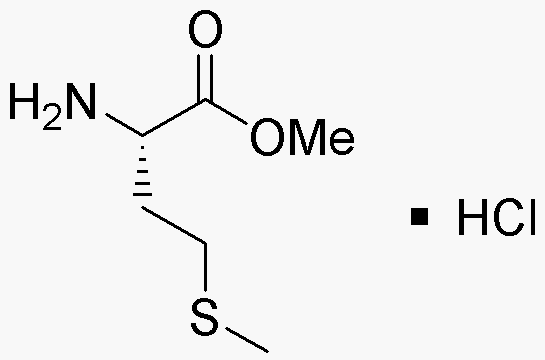L-Methionine methyl ester hydrochloride is widely utilized in research focused on:
- Pharmaceutical Development: This compound is used in the synthesis of various pharmaceuticals, particularly those targeting metabolic disorders, due to its role as an amino acid precursor.
- Animal Nutrition: It serves as a feed additive in the livestock industry, enhancing growth rates and improving overall health by providing essential sulfur-containing amino acids.
- Cosmetic Formulations: Its antioxidant properties make it a valuable ingredient in skincare products, helping to protect skin cells from oxidative stress and promoting a youthful appearance.
- Biochemical Research: Researchers utilize it in studies related to protein synthesis and enzyme activity, providing insights into metabolic pathways and cellular functions.
- Food Industry: It is used as a flavor enhancer and nutritional supplement in food products, contributing to better amino acid profiles and overall nutritional value.
General Information
Properties
Safety and Regulations
Applications
L-Methionine methyl ester hydrochloride is widely utilized in research focused on:
- Pharmaceutical Development: This compound is used in the synthesis of various pharmaceuticals, particularly those targeting metabolic disorders, due to its role as an amino acid precursor.
- Animal Nutrition: It serves as a feed additive in the livestock industry, enhancing growth rates and improving overall health by providing essential sulfur-containing amino acids.
- Cosmetic Formulations: Its antioxidant properties make it a valuable ingredient in skincare products, helping to protect skin cells from oxidative stress and promoting a youthful appearance.
- Biochemical Research: Researchers utilize it in studies related to protein synthesis and enzyme activity, providing insights into metabolic pathways and cellular functions.
- Food Industry: It is used as a flavor enhancer and nutritional supplement in food products, contributing to better amino acid profiles and overall nutritional value.
Documents
Safety Data Sheets (SDS)
The SDS provides comprehensive safety information on handling, storage, and disposal of the product.
Product Specification (PS)
The PS provides a comprehensive breakdown of the product’s properties, including chemical composition, physical state, purity, and storage requirements. It also details acceptable quality ranges and the product's intended applications.
Certificates of Analysis (COA)
Search for Certificates of Analysis (COA) by entering the products Lot Number. Lot and Batch Numbers can be found on a product’s label following the words ‘Lot’ or ‘Batch’.
*Catalog Number
*Lot Number
Certificates Of Origin (COO)
This COO confirms the country where the product was manufactured, and also details the materials and components used in it and whether it is derived from natural, synthetic, or other specific sources. This certificate may be required for customs, trade, and regulatory compliance.
*Catalog Number
*Lot Number
Safety Data Sheets (SDS)
The SDS provides comprehensive safety information on handling, storage, and disposal of the product.
DownloadProduct Specification (PS)
The PS provides a comprehensive breakdown of the product’s properties, including chemical composition, physical state, purity, and storage requirements. It also details acceptable quality ranges and the product's intended applications.
DownloadCertificates of Analysis (COA)
Search for Certificates of Analysis (COA) by entering the products Lot Number. Lot and Batch Numbers can be found on a product’s label following the words ‘Lot’ or ‘Batch’.
*Catalog Number
*Lot Number
Certificates Of Origin (COO)
This COO confirms the country where the product was manufactured, and also details the materials and components used in it and whether it is derived from natural, synthetic, or other specific sources. This certificate may be required for customs, trade, and regulatory compliance.


